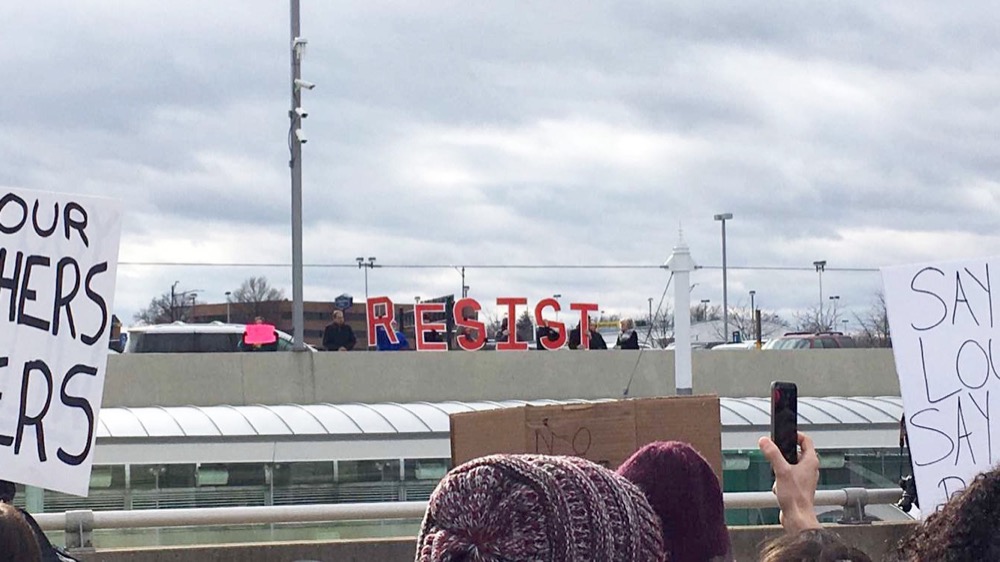Chancellor Mark Wrighton called for the withdrawal of an executive order signed by President Donald Trump in an email sent to the Washington University community early Sunday evening. The executive order, signed Friday, bans immigration to the United States from six predominantly Muslim nations for 90 days, as well as Syria indefinitely.
A total of 41 students and eight scholars participating in international programs at Washington University, primarily in masters and Ph.D. programs, are citizens of four of the countries affected by the ban, Vice Chancellor for Public Affairs Jill Friedman confirmed. They are citizens of Iraq, Iran, Syria and Sudan and—under the executive order—would not be allowed to reenter the United States by the Department of Homeland Security if they were to leave.
Clik here to view.
 Courtesy of Ayesha Harisinghani
Courtesy of Ayesha HarisinghaniA group of protestors hold up letters spelling out “Resist” during the protest.
The University is still gauging “the full breadth of the impact,” of the executive order on members of the University community, Friedman added, stating that these 49 individuals are the minimum of whom the executive order could affect.
Wrighton’s statement has been in line with similar announcements from administrators from schools around the country and also outlined his support for a statement made by the Association of American Universities, which also calls for Trump to rescind the executive order.
“It is having a never direct, negative impact on specific members of our community and the executive order should be withdrawn,” Wrighton’s statement reads.
Wrighton added that he was also personally contacting members of Congress.
However, Wrighton’s statement was met with mixed reviews—many were glad he addressed the issue, but some didn’t think he went far enough.
“It was a good first step,” freshman Hannah Wheaton, president of the College Democrats, said. “However, upon receiving the email, I expected a more forceful protection for students here at Wash. U. …I hope for a more humanitarian response and a less political one.”
Other students also took note of what Wheaton called a lack of “direct language” by the Chancellor in his statement. Specifically, that he failed to mention religious implications of the executive order that has been nicknamed the “Muslim Ban.”
“[Wrighton] should be making sure that he’s not inadvertently contributing to the erasure that this was not just a general act,” junior Jonah Klein-Barton said. “This was targeted at certain countries with high Muslim populations.”
Klein-Barton, who is looking to start a new student group called Wash. U. Progressives aimed at community outreach, was one of several students to directly reach out to Wrighton after receiving the statement. In what Klein-Barton described as a brief phone call with Wrighton, he voiced his concern at the exclusion.
“I basically just said thank you for sending out an email, thank you for taking a stance in opposition, and then pointed out that the fact that there was no mention that it targeted Muslims and predominantly Muslim countries,” Klein-Barton, who wasn’t expecting Wrighton to answer the call, said.
Klein-Barton also compared Wrighton’s omission to Trump’s failure to mention Jews or anti-Semitism during his remarks on Holocaust Remembrance Day, also released on Friday.
“I see this as a similar thing pointing out that something is or was bad, but refusing to name the group impacted by it,” Klein-Barton said.
Wheaton also noted that Wrighton’s letter did not include intent for any specific action on the part of the University beyond advising affected community members to consult with the Office for International Students and Scholars.
“One response could have been to ensure that the names of the students who are here at this university who are from those nations would not be released,” Wheaton said. “That might be a good first step.”
It would match steps taken by the University of Michigan, which released an official statement that it would not share the immigration status of its students.
New York University also took a similar approach, stating that the administration would, “not permit federal officials on campus to gather information about immigrants in our community absent a subpoena or similar legal order,” in a release from President Andrew Hamilton
Daniel Epps, an associate law professor at Washington University, is also offering pro bono legal services to those affected by the executive order, according to Jezebel.
Sophomore Zach Persing, the president of the College Republicans, pointed to the club’s official statement sent to Student Life where the club denounced the executive order.
“As a nation that is comprised of countless immigrants and refugees, we cannot simply turn our back on them because of fear,” the statement reads. “We need to embrace the opportunity to properly vet immigrants and refugees and welcome them into our nation with open arms.”
Additional reporting by Noa Yadidi.